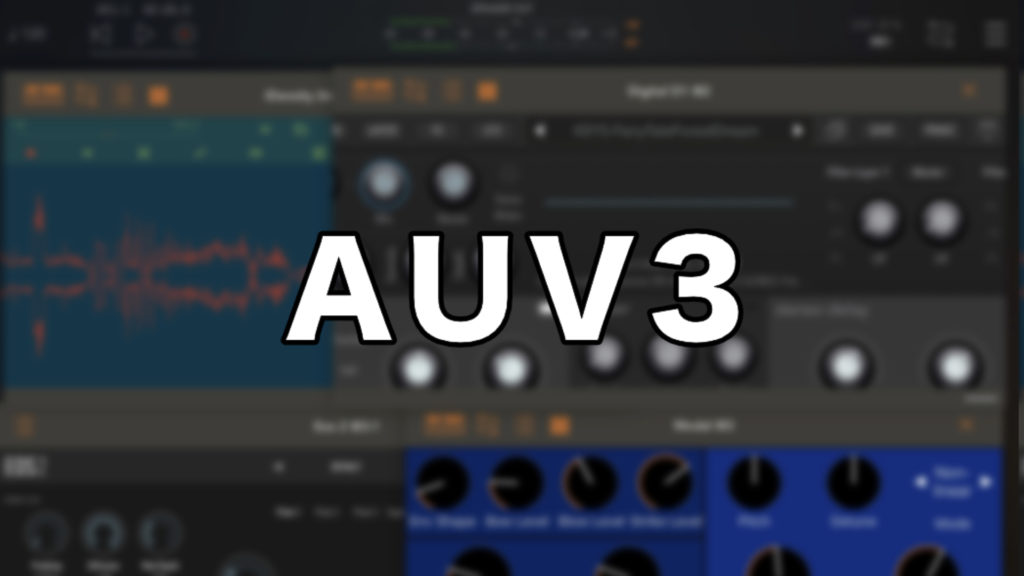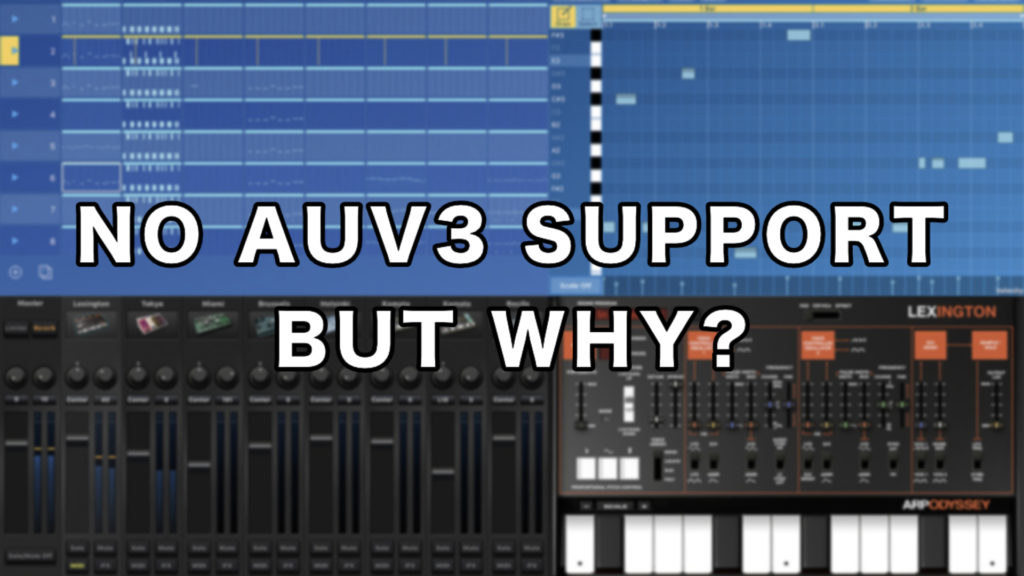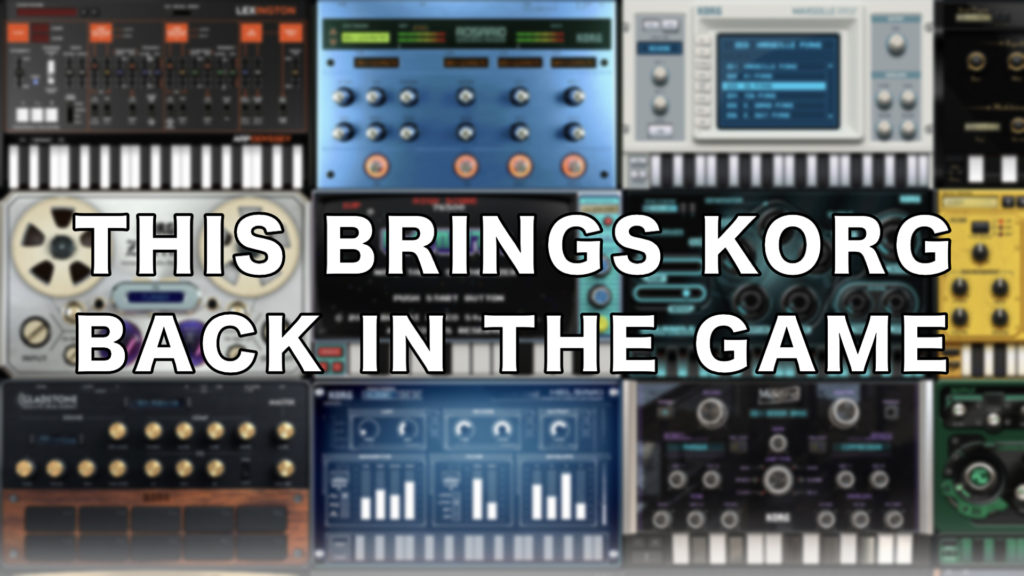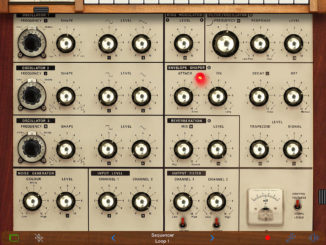KORG vs. AUv3 support: will KORG lose its iOS lead in 2019 or will they change anything?
Apple announced during this year’s WWDC 19 that Inter-App Audio (IAA) on iOS devices will no longer be supported/offered in future OS. Of course, mobile musicians were especially worried about not integrating no-AUv3 apps into DAW or host applications.
For developers, there are actually two directions: either they invest time in their apps and turns them into AUv3 or leave them as they are. In the near future, they are risking that they will not be able to sell large quantities of them (less interest in no-AUv3 apps) and that musicians will not be able to use them in their setups because of the missing AUv3 interface. Setting on AudioBus is no longer an option as this app was previously based on the IAA technology and now trust on AUv3. Good move!
The market for music applications with AUv3 support is growing and growing and will continue to do so in 2019. It’s nice to see that small indie developers as well as well-known companies taking the step on this modern technology. Nice examples are here: Eventide, FabFilter, Moog Music, etc.
But wait, do not miss here a big company with great influence on mobile music-making? Yes, KORG, the Japanese company that has a huge amount of different apps on the Apple App Store (Gadget, iMS-20…), currently has no app with AUv3 support (July 2019). Very sad in my opinion, if one notices that KORG is one of the companies that made iOS music-making big with apps like Gadget or with their standalone Synthesizers. But why?
KORG has not released any official statement telling if they plan to release updates or if they have plans to make it. If this does not change in 2019, KORG is gambling away its iOS advantage completely in my opinion, as it lacks the current most important connection technology for iOS, AUv3. Possible reasons why no KORG has AUv3 support can be:
Cost, Personal & Time Factors
Transforming existing apps into AUv3 format takes time, and this, in turn, cost money and you need experienced developers who can implement that. From the latter, I am completely convinced that KORG has these. A look at the great iOS apps clearly shows their knowledge. Only the cost and time factors remain. Turning many apps upside down and updating takes a lot of time and cost money. KORG may justify the decision to focus on current apps as it is more important.
Especially since it is difficult for an existing app to ask for money again. Either you make a free update, an in-app purchase (no idea if this is possible with AUv3 update) or you have to sell each app as a new app. The moment would certainly not be favorable, because KORG has released a completely new Gadget 2 version at NAMM 2019, but without AUv3 support. These two factors could be a reason.
We Do Not Open/Leave Our Living Room
With Gadget KORG has for some years its own digital audio workstation (DAW) with a variety of great-sounding vintage and modern Synthesizers/drum machines. With this, the company invites almost every hobby and professional musician to write their own tracks. So far, the concept has worked: Gadget is a huge success for the Japanese company, which also regularly updates it for free with major new features. With the integration of their standalone Synthesizer apps for iOS, KORG offers a further incentive for using Gadget on iOS. Buy a standalone synth app and you’ll get the Gadget version of the synth for free, clever move. However for how long.
A big problem of Gadget is the lack of integration of other 3rd party apps. In this one is thus forced to use the built-in instruments and effects. The lack of an AUv3 host function can only possibly be explained by the fact that KORG does not open or leave its own living room for strangers. For individual Gadget instruments and effects, this would be strange because all Gadgets are available as a PC/Mac plugin on the market. See KORG Gadget Plugins for PC & Mac.
One thing is certain: KORG has to do something in this iOS area. We iOS musicians currently do not need new apps, in-app purchases or mini updates. What we want for a long time is AUv3 support, so that all apps are ready for the future. Plus, it gives us the possibility to use these apps in multiple instances what is currently only available in Gadget. Apple has said clearly: we rely on Audio Unit version 3 and not on Inter-App Audio. If KORG does not change that, they lose their advantage in mobile music. Eventide or FabFilter showed how it works in the last days.
To continue to be one of the most important companies in mobile music-making, I recommend:
- Minimum: AUv3 support for all standalone apps (iMS-20, PolySix…). Gadget is not a must because it operates in its own iOS environment. In a free update or by buying a new app. KORG has already turned his Gadgets instruments/effects into Apple Audio Units for macOS some time ago. So the basis for a transformation to AUv3 exists.
- Very pleasing: AUv3 support for all standalone apps including Gadget in the form of a free update
- Maximum: AUv3 support for all standalone apps including Gadget including the possibility for an AU hosting function.
Why Am I So Directly With KORG & Not With Many Other Developers?
Simple: the mobile music making products of KORG are no 1-5€ applications from the Apple App Store but rather cost 30€ and more. With such high prices, expectations for an iOS app are also rising. Plus, marketing promises: “evolving to the next generation”. Next-generation means also AUv3 support. If such a high-priced app has no technology of 2019, it will no longer be one of my iOS highlights from 2019.
Young indie developers like AudioKit Pro recently showed with its D1 Digital that even small companies update their apps to AUv3. Plus this app cost less than 10€. Now comes also AudoKit Synth One as AUv3, then KORG should seriously worry about what they are doing wrong currently in the app development.
KORG, we love your apps (Gadget, Synthesizers…) because of the awesome sound quality, nice interface and so on, but all apps are not ready for 2019. Change something and be part of the best iOS music app manufacturers.
This article is possible through the help of the Patreon supporters, thanks for that, you are great!
More information here: KORG







I enjoyed your article, but I felt that some clarity was needed.
KORG vs. AUv3 support: will KORG lose its iOS lead in 2019 or will they change anything?
Apple announced during this year’s WWDC 19 that Inter-App Audio (IAA) on iOS devices will no longer be supported/offered in future versions of the operating system. With this, mobile musicians have become especially worried about the integration of non-AUv3 apps into their digital audio workstations (DAW) or other host applications.
For developers, there are only two options: invest time in their apps and update their non-AUv3 apps into AUv3, or leave them as they are. By not updating their apps, developers are risking that they will not be able to sell them as there is less interest in non-AUv3 apps..
[EDIT]: The sentence here of AudioBus being useless because it is based on IAA is inaccurate. https://cdm.link/2019/06/iaa-audiobus-ios-13/
Thanks for the feedback. The core of the first two versions of AudioBus (1/2) was based on Inter-App Audio but the developer replaced it in v3 with the AUv3 technology but implemented IAA support. So it’s ready for the future. I wrote: Setting on AudioBus is no longer an option as this app was “previously” based on the IAA technology and now trust on AUv3. Good move!
So I wrote this because before some years it was a big topic to write in the App descriptions: we have AudioBus support. This information is still relevant for AudioBus 2 users as it based on IAA technology. Since v3 Audiobus is more a classic host for AUv3 apps and IAA. So AudioBus 2 will be no longer a topic when Apple removes IAA support in future iOS versions.
How’s that synth one AUv3 going? xD